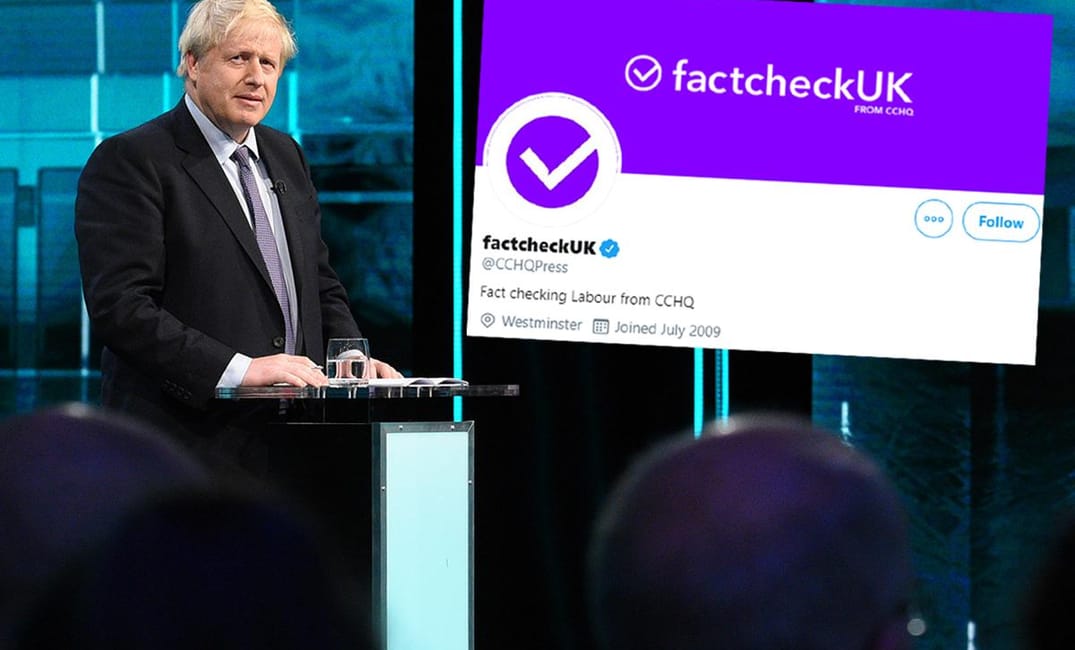The Conservative Party Campaign Headquarters (CCHQ) seems to be pulling out all the stops for December’s general election, ramping up its use of social media to create viral content that mocks and attacks Jeremy Corbyn and the Labour Party.
Just last week, in the midst of the first televised debate between Boris Johnson and Jeremy Corbyn, the CCHQ changed their twitter account to “Fact Check UK”, posting tweets such as, “Boris Johnson is the clear winner in tonight’s leaders debate” under the new twitter handle. This audacious attempt to mislead potential voters into thinking that the Conservative campaign was actually an independent fact checking organisation has been widely criticised by political commentators and Twitter itself. The organisation said it would take “decisive corrective action” if another attempt was made to mislead the public.
Dominic Raab, the Secretary of State, said in a televised interview that “no one gives a toss about the social media cut and thrust.” But actually the numbers say different. The CCHQ gained 1,160 new followers on the night of the debate and had 16,700 interactions. It’s clear that the Conservative campaign tactic of creating viral, controversial posts has had some success. One such post that went viral was a photoshopped image of Jeremy Corbyn in a chicken suit, with the acronym “JFC”. The post was retweeted by Tory ministers and was liked 13,000 times, with over 4,000 retweets.
This tactic of churning out hyperbolic, divisive social media content, or “sh*tposting”, has been spearheaded by the Australian PR firm Topham Guerim. The firm helped facilitate a shock electoral win for the Liberal-led coalition government in Australia. The Telegraph reported last month that the firm was brought in to create a “24-hour meme factory”, and the campaign has certainly experienced a spike in social media interaction in the last few months.

However, the real question is whether a spike in social media activity necessarily equates to more votes. Some of this spike in social media activity includes users who have shared the ads in order to mock the design or the font used in the slogans (comic sans, if you’re interested). Labour, in contrast, have gone down a different route, creating posts that support Jeremy Corbyn and champion Labour’s domestic policy agenda. While the Labour campaign have of course attacked Boris Johnson and the Conservative Party on social media, they haven’t yet opted for the kind of controversial, attention-grabbing content that could be termed “sh*tposting”.
The incident of “FactCheck-gate” doesn’t just bring up issues of whether or not aggressive social media campaigns actually have a positive influence on voting behaviour, but also of how social media platforms should respond to blatant political misinformation. Twitter became the first major social media platform to say that it would completely block political ads. Google announced that it would not allow political ads to target particular groups, other than basic demographic categories like age, gender and geographic location. Facebook has been less forthcoming in moderating political advertising, with Mark Zuckerberg standing before the US House of Representatives Financial Services Committee and admitting that Facebook would not take down political misinformation.
The Wall Street Journal recently reported that Facebook is considering following Google’s example and barring political campaigns from “micro-targeting” (targeting very small groups of people). However, Zuckerberg has yet to announce anything concrete. The tactic of “micro-targeting” was used by Cambridge Analytica, the now defunct British consultancy firm that advised the 2016 Trump campaign and had ties to the Vote Leave campaign. The tactic has also been used by the Russian group, Internet Research Agency, to spread misinformation and cause division in the lead-up to the 2016 election.

Further backlash against social media companies spreading misinformation has come from an unlikely source. Actor Sacha Baron Cohen has come out and attacked tech companies for being responsible for the “greatest propaganda machine in history”, resulting in a surge of hate crimes. Baron Cohen pointed out that Zuckerberg’s defence that Facebook promotes “freedom of speech” should not be used as an excuse to spread lies and bigotry. Could it be that the tide has finally turning against “fake news?
Only on December 12 will we know if CCHQ’s controversial social media strategy will actually result in a higher vote share from younger voters. However, regardless of the election results, it does seem like people are fed up with seeing endless political “sh*tposting” on their social media feeds. If we want to move towards a less divisive political culture in this country, lies and misinformation need to be challenged.

